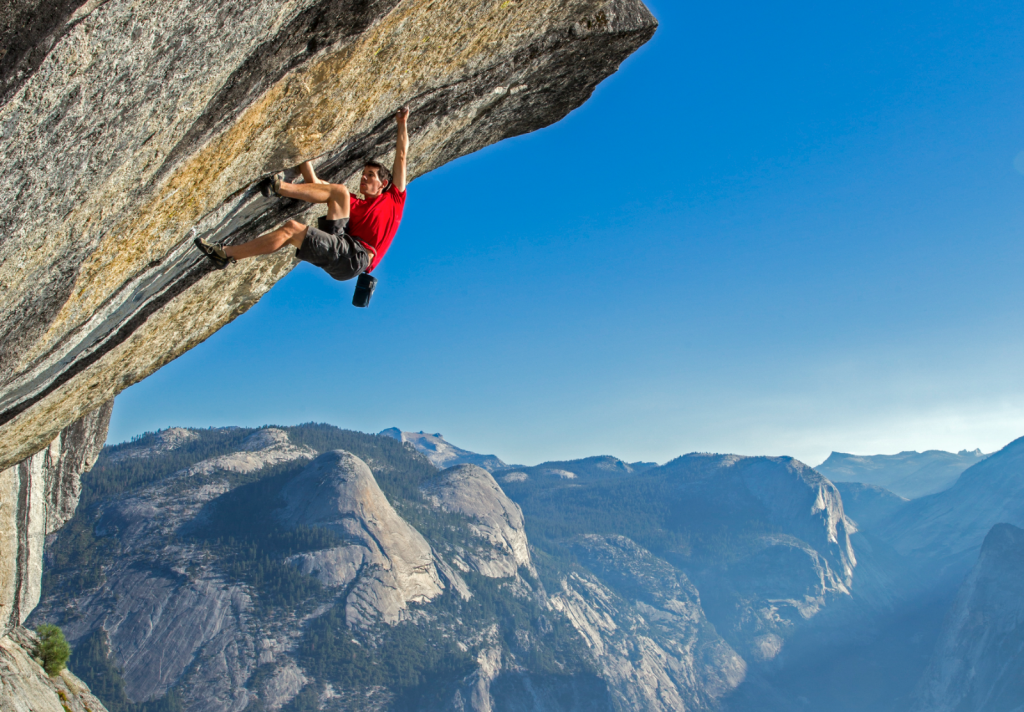“Then the devil took him to the holy city, and set him on the pinnacle of the temple, and said to him, ‘If you are the Son of God, throw yourself down; for it is written: He will give his angels charge of you,’ and ‘On their hands they will bear you up, lest you strike your foot against a stone.’ Jesus said to him, ‘Again it is written, You shall not tempt the Lord your God.’ ”
— Matthew 4:5–7
I have an almost morbid fear of heights.
So I’m fascinated by Philippe Petit (b. 1949), the French high-wire artist, and more recently, by Alex Honnold, the only person on earth to have climbed the face of Yosemite’s El Capitan without ropes.
The documentary “Man On Wire” (2008), tells Petit’s story. In 1971, he evaded the authorities and walked between the towers of Notre Dame Cathedral.
Next he somehow managed to string a clandestine cable between New York City’s Twin Towers. On the morning of Aug. 7, 1974, he set forth and in the course of 45 minutes, crossed between them eight times. At one point, he stopped in the middle with his balancing pole to sit down, take a bit of a breather, and survey his realm. He was 24 years old.
When asked by the police why he’d done it, he allegedly replied, “If I see three oranges, I have to juggle. And if I see two towers, I have to walk.”
Honnold similarly feels that free soloing (that is, climbing without ropes, harness, or a safety net of any kind) is his vocation and his destiny. The activity is so dangerous that less than 1% of people who climb attempt it. Of course he was scared: the face of “El Cap” is almost a vertical wall: “3,200 feet of sheer granite.” Still, “I’ll never be content, until I at least put in the effort.”
He climbed it with ropes for 20 years. He mapped out every inch of the wall on paper, in his brain, in his fingertips, nerves, and toes.
And then, in June 2017, he did it. “Free Solo,” the 2018 Oscar-winning documentary that charted the climb, is a thrilling watch.
The extreme discipline and dedication, the relentless training, and the sheer physical beauty are stunning. A human being almost dancing on an inch-thick cable 1,350 feet in the air! Another young man, single-handedly scaling a rock face so sheer and so high that many of us are afraid just looking at it on a screen!
These are feats of the human mind, body, and spirit that border on the miraculous and before which we instinctively, and rightly, bow in homage.
And yet, in both cases an element struck me as missing. Petit reached the end of his walk; Honnold clambered over the lip of El Capitan. Neither knelt and gave thanks, or in any way acknowledged the help of a power greater than themselves.
Instead, after being released by the cops, Petit ditched the loving, loyal group who had accompanied him every step of the way, including his long-term girlfriend, and spent the night with a groupie.
Honnold called his girlfriend on his cell phone, then descended to his van and performed his usual workout. Last year he appeared nude in ESPN’s annual Body Issue.
It’s impossible not to like and admire both these guys. But their adventures raise an age-old question: Does belief in God weaken or strengthen? Does love make a person soft?
The climbing guys know, for example, that a woman is bad news. A woman, whether she wants to or not, sets up a conflict between her and climbing.
A woman, simply by her existence, poses the question: What if something were at stake beyond our own sense of self-accomplishment? How steady would any of us be if we knew a fall would mean leaving behind a wife, or husband, or child?
Both Petit and Honnold practiced obsessively and incessantly, memorizing every inch of the cable, every handhold and foothold.
“I like to differentiate between risk and consequence,” says Honnold. “The chance of me falling off is quite low even though the consequence is extremely high.”
That may be, but what of a risk in which the consequence is certain death? What of the first responders who will be tasked with cleaning up scattered body parts? What of the people left behind to imagine what he experienced and felt?
And what does this have to do with the temptation of Christ in the desert? We don’t have to throw ourselves off the parapet, Christ seems to be telling us. Life — the world — will push us off, again and again.
The fact is that if our goal is to grow in love, then all of life is lived on a precipice, a tightrope, an inch-thick cable. To know our only safety net consists in prayer, fasting, and almsgiving — and to keep walking — now that’s a feat that borders on the miraculous.
That’s why, especially this season, we entreat the angels to come and minister to us.

